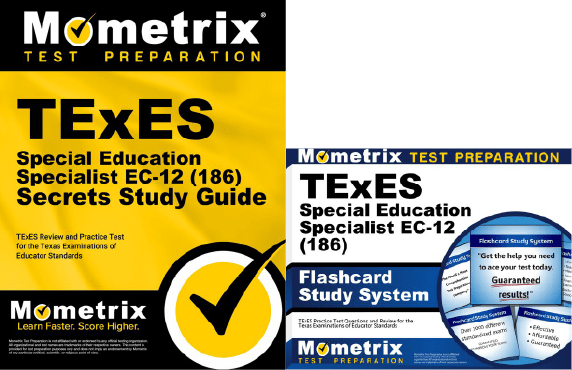If you need help studying for the TExES Special Education Specialist EC-12 exam or just want some more information about what the exam is like, you’ve come to the right place.
Click below to take a free TExES Special Education Specialist EC-12 practice test!
What’s on the Exam?
There are 90 multiple-choice questions and one constructed-response question on the exam, and the time limit is 4 hours and 45 minutes. There aren’t any scheduled breaks, but you’re free to take restroom breaks as needed.
Let’s take a closer look at the different sections of the exam.
1. Legal and Ethical Guidelines and Knowledge of Learners
18% of the exam
- IDEA eligibility categories and definitions
- Key federal and state laws and landmark cases shaping special education
- Differences between IEPs and Section 504 plans
- Child Find duties of special education teachers
- Core components and timelines of IEPs and IFSPs
- Roles and decision-making of the ARD committee
- Schoolwide responsibilities for implementing IEPs with fidelity
- Ensuring LRE by auditing schedules and placements for compliance
- Confidentiality rules and maintenance of student eligibility records
- Requirements for transition planning beginning at age 14
- How disabilities affect development, learning, and socialization
- How brain development informs learning and behavior
2. Assessment and Program Planning
18% of the exam
- Types and purposes of assessments across settings
- Administering screeners and diagnostics and collecting baseline data
- Using formative and summative assessment cycles
- Techniques for assessing both academic skills and behavior
- Selecting accommodations and modifications for fair assessment access
- Analyzing results from multiple measures and evaluation sources
- Interpreting assessment data for varied decisions and audiences
- Setting learning goals and adjusting instruction based on evidence
- Considering academic, social, and functional development when determining IEP support needs
- Coordinating assessment and planning with teachers and service providers
- Translating results into present levels, goals, and services for IEP drafts
- Preparing effectively for ARD meetings using assessment data
3. Curricular Knowledge and Instructional Practices
27% of the exam
- Designing specially designed instruction with clear goals and objectives
- Using TEKS standards to guide instructional and program decisions
- Differentiating and modifying instruction across a wide range of performance levels
- Building explicit, scaffolded, and systematic lessons tailored to student needs
- Identifying and reducing accessibility barriers for learners with disabilities
- Distinguishing between accommodations and modifications in instruction
- Selecting and integrating appropriate assistive technologies
- Planning engaging, age-appropriate, and meaningful learning experiences
- Establishing routines and procedures for safe, orderly classrooms
- Applying research-based de-escalation and crisis-prevention strategies
- Using FBAs to collect data and design behavior intervention plans
- Monitoring and adjusting behavioral and instructional interventions for effectiveness
4. Professional Collaboration, Learning, and Responsibilities
18% of the exam
- Partnering with families, staff, and specialists using differentiated collaboration
- Supervising and coaching paraprofessionals with clear roles and expectations
- Co-planning, consulting, and co-teaching effectively with colleagues
- Embedding community resources in IEP transition activities
- Collaborating seamlessly with general education teachers
- Working with multidisciplinary teams to design and deliver instruction
- Choosing tools that strengthen communication with families and the community
- Coordinating with related services and outside agencies
- Understanding the full scope of the EC–12 special education teacher role
- Advocating effectively for improved outcomes for students receiving special education services
- Setting short- and long-term professional goals using student-learning data
- Encouraging active family and student participation throughout the IEP process
5. Analysis and Response
20% of the exam
You’ll write a short essay analyzing a few sources of data to identify the strengths and needs of a given student, and you’ll need to include a design for appropriate instruction.
How to Register
To get started with your registration, you’ll need to create an account on the NES website. You can then register for the exam and schedule a test date through your account.
Exam Scores
The test is scored using a scaled scoring method. Here’s how it works:
For every question you answer correctly, you get one point added to your raw score. At the end of the test, your final raw score will be converted to a scaled score. This scaled score will range somewhere between 100 and 300.
The reason your raw score is converted to a scaled score is because everyone who takes the test is given a slightly different set of questions. Since everyone has a different arrangement of questions, and because some questions are harder than others, converting your raw score to a scaled score ensures a more even playing field.
FAQs
How many questions are on the TExES Special Education Specialist EC-12 exam?
The exam contains 91 questions.
What is the time limit for the TExES Special Education Specialist EC-12 exam?
The exam is timed at 4 hours and 45 minutes.
What is the passing score for the TExES Special Education Specialist EC-12 exam?
You’ll need to get a final score of at least 240 to pass.
How much does the TExES Special Education Specialist EC-12 exam cost?
The testing fee is $136.
Mometrix Test Preparation is not affiliated with or endorsed by any official testing organization. All organizational and test names are trademarks of their respective owners.



 TExES Study Guide
TExES Study Guide TExES Flashcards
TExES Flashcards